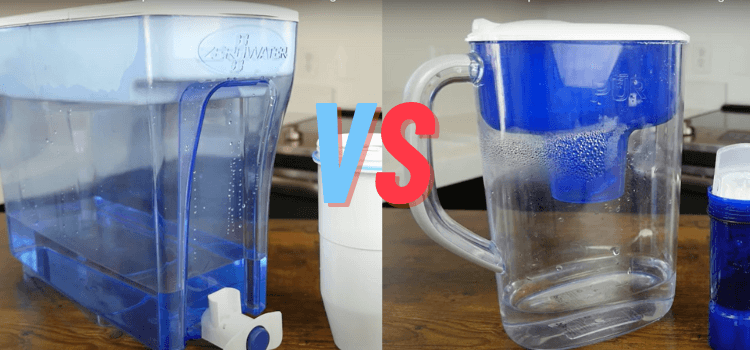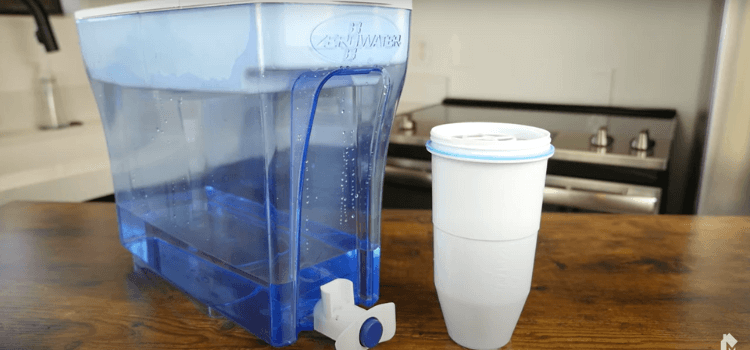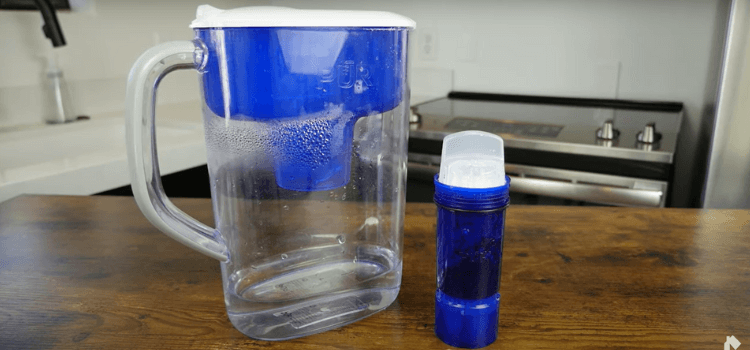In today’s world with escalating concerns about water pollution, the necessity for access to clean and safe drinking water cannot be overstated. With various filtration systems available in the market, consumers often find themselves in a dilemma when choosing between brands like Zero Water and PUR. Both claim to provide clean water, but which one is better? Let’s dive deeper into the comparison of Zero Water vs. PUR to help you make an informed decision.

Zero Water vs PUR Comparison Table
Name | Brand | Special Feature | Product Dimensions | Price |
ZeroWater | ZeroWater | Change Filter Indicator, IAPMO Certified Water Filter Pitcher, Compatible With Zero Water Replacement Filters, Ergonomic Handle, Included TDS Meter | 14.96"L x 5.51"W x 10.63"H | |
PUR PLUS | PUR | NSF certified | 11.4"L x 4.9"W x 10.4"H |
Understanding Zero Water
Zero Water is a brand known for its innovative filtration technology, which aims to remove virtually all dissolved solids from tap water. The filtration process involves a combination of activated carbon and an ion exchange resin, resulting in water that is free from impurities and contaminants.
Understanding PUR Water Filters
On the other hand, PUR is another prominent player in the water filtration industry. PUR offers a range of products, including faucet-mounted filters, pitchers, and dispensers, all designed to provide clean and great-tasting water. PUR filters primarily utilize activated carbon and ion exchange to reduce contaminants.
Zero Water vs. PUR: Filtration Process Comparison
Zero Water Filtration Process
Zero Water employs a five-stage filtration process, including activated carbon and an ion exchange resin. This process effectively removes dissolved solids, such as lead, chlorine, and chromium, ensuring water purity.
PUR Filtration Process
PUR filters also utilize activated carbon and ion exchange technology. However, the specific filtration process may vary depending on the type of product, such as faucet-mounted filters or pitchers. Overall, PUR aims to provide clean and refreshing water by reducing various contaminants.
Zero Water vs. PUR: Performance
Removal of Contaminants
When comparing Zero Water vs. PUR, both brands claim to effectively reduce common contaminants found in tap water. However, independent testing has shown variations in their performance levels, particularly concerning the removal of dissolved solids and heavy metals.
Comparison of Contaminant Removal
Independent studies have revealed that Zero Water typically achieves a higher reduction in total dissolved solids (TDS) compared to PUR filters. While both brands can effectively reduce contaminants like lead and chlorine, Zero Water may offer slightly better performance in terms of water purity.
Zero Water vs. PUR: Cost Comparison
Initial Cost
In terms of initial cost, PUR water filters are often more affordable compared to Zero Water systems. This makes PUR an attractive option for budget-conscious consumers looking for basic water filtration solutions.
Long-Term Cost
However, when considering the long-term cost, Zero Water may prove to be more economical. Since Zero Water filters tend to have a higher capacity and lifespan, they require less frequent replacements, ultimately saving money over time.

Zero Water vs. PUR: Convenience
Ease of Use
Both Zero Water and PUR provide filtration systems that are designed for user convenience, ensuring effortless installation and operation. Whether selecting a pitcher, faucet-mounted filter, or dispenser, both brands emphasize simplicity and ease of use.
Maintenance
When it comes to maintenance, Zero Water filters may require more frequent cartridge replacements compared to PUR filters. However, this can vary depending on water quality and usage patterns. PUR filters typically offer longer-lasting cartridges, reducing the hassle of frequent replacements.
Zero Water vs. PUR: Environmental Impact
Waste Generation
One aspect to consider is the environmental impact of using water filters. While both Zero Water and PUR aim to reduce plastic waste through their refillable cartridges, the overall environmental footprint may differ. Zero Water’s focus on removing dissolved solids may result in more frequent cartridge replacements, potentially leading to increased waste generation.
Carbon Footprint
Additionally, the manufacturing and distribution processes of Zero Water and PUR filters contribute to their carbon footprint. Factors such as transportation, energy usage, and material sourcing can influence the environmental sustainability of these products.
Zero Water vs. PUR: Consumer Reviews
Positive Reviews
Consumers who have used Zero Water often praise its ability to produce crisp and refreshing water with minimal taste or odor. Many appreciate the brand’s commitment to water purity and the thorough filtration process.

Negative Reviews
Several users have voiced concerns about Zero Water filters clogging prematurely or showing a decline in performance over time. Furthermore, there are apprehensions regarding the environmental repercussions of frequent cartridge replacements.
Conclusion
In conclusion, both Zero Water and PUR offer viable options for achieving clean and safe drinking water at home. The choice between the two ultimately depends on your specific needs and preferences. Consider factors such as filtration performance, cost, convenience, and environmental impact when making your decision.
FAQ
The answer depends on your priorities. Zero Water may offer superior filtration performance in terms of reducing dissolved solids, while PUR filters are generally more affordable.
The frequency of cartridge replacements depends on water quality and usage. On average, Zero Water recommends replacing the filter when the TDS meter reads above 006 ppm.
While PUR filters are not specifically designed to remove fluoride, they may reduce its presence along with other contaminants.
Yes, Zero Water filters are suitable for use with well water, but regular testing is recommended to ensure optimal performance.
PUR filters are primarily designed to reduce common contaminants found in tap water, but they may not effectively remove bacteria. For bacteria removal, additional treatment methods may be necessary.